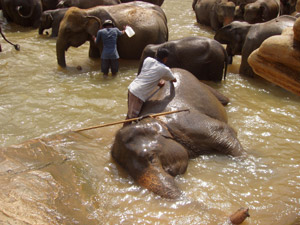
At Pinnewala Elephant Sanctuary, elephant handlers, known as mahouts, help the pachyderms take a bath in the Mahaweli River, Sri Lanka. (Credit: Gina Wilkinson)
Many of these animals are wild elephants brought into this government-run sanctuary for medical treatment.S. R. B. Dissanayake is an ecologist with the Sri Lankan Wildlife Department.He says many of the elephants here were attacked by farmers desperate to prevent the animals destroying their livelihoods.
DISSANAYAKE: With the nightfall, they come out and raid crops… It's like opening a supermarket for elephants. So, then, they come into conflict with people. Usually 140 to 160 elephants are killed annually and that means three elephants a week and one human; that's the rate.
WILKINSON: The elephant is a national symbol and highly revered in Sri Lanka.
But over the past three decades, rapid population growth and deforestation have gradually caused conflict between pachyderms and humans. Forest cover has fallen from 44 percent to almost half that amount in just 50 years, with close to 100 thousand acres lost annually to logging and land clearing for agriculture.
New villages are springing up in what was once elephant territory. With Sri Lanka's population expected to double within 30 years, pressure on the pachyderm's natural habitat is set to rise even further.
Ecologist S.R.B. Dissanayake says many Sri Lankans are conflicted about their troubles with elephants.
DISSANAYAKE: It is a Buddhist country. People don't like to kill animals because killing is prohibited according to our religion. But, sometimes, they are compelled to kill because of the anger they have, because they lose their way of living because of these elephants.
WILKINSON: A century ago, Sri Lanka had more than 12,000 wild elephants. Now, that figure is estimated to be as low as 3,500.
The government has tried to set aside elephant habitat by making several protected national parks. It's recently built new waterholes and encouraged the growth of indigenous plants to attract and keep elephants inside the reserves.
But, it's believed that 70 percent of elephants live outside these protected zones, in areas also inhabited by farmers. The wildlife department is also planning special wilderness corridors to allow pachyderms to travel from one protected nature reserve to another without passing through villages and farmland.
Another proposal calls for building electric fences around some of the most vulnerable farming communities. Lower cost solutions are being tested in villages like Veheragala.
[BELL RINGING]
WILKINSON: Instead of turning to guns and poison, villagers in Veheregala are now using large bells, supplied by the Millennium Elephant Foundation, to scare away roaming pachyderms. Long ropes allow villagers to ring the bells from inside their houses when they see or hear the animals approaching.
And since most elephant attacks occur at night under the cover of darkness, Veheregala is particularly vulnerable because most homes don't have power and there's just one streetlight for the whole village.
Lyn Burnett, a volunteer with the Millennium Elephant Foundation, says they hope to reduce this problem by building an environmentally friendly bio gas plant.
BURNETT: The villagers will be putting in elephant dung, cattle dung and other human wastes and then that decomposes produces the gas, which is collected within the cylinder. And the gas that is collected will be used to either fuel three lamps which will burn each for four hours or one lamp that burns for ten hours.
WILKINSON: The villagers can also use the sludge produced by the bio gas plant as fertilizer for their crops and vegetable gardens.
[ELEPHANT TEARING LEAVES AND BRANCHES]
WILKINSON: Back at the Pinnewala elephant sanctuary, tourists watch a massive six-ton elephant tear leaves and branches from a tree. It's easy to see how he could destroy a field of crops in just a few hours.
[SOUND OF LEAVES AND BRANCHES CONTINUES]
WILKINSON: The 60-year-old bull is almost blind. Veterinarians suspect his eyes were damaged by a blast from a farmer's gun. Wildlife experts believe more pachyderms are likely to suffer a similar fate and the problem of human-elephant conflict won't be solved overnight. But officials, as well as villagers and conservation groups, hope they ‘re now on track to find a long-term balance that protects both farmers and the country's revered elephants.
For Living on Earth, this is Gina Wilkinson, in central Sri Lanka.
[MUSIC: Kronos Quartet "Escalay (Water Wheel)" Kronos Quartet: Pieces of Africa (Elektra Nonesuch) 1992]